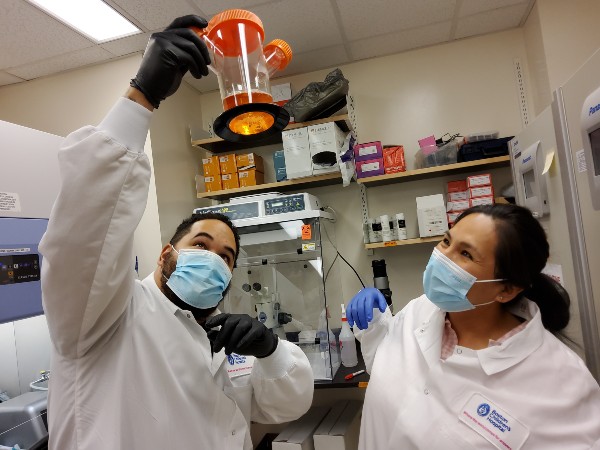For Scientists
Core Facilities
Human Neuron Core
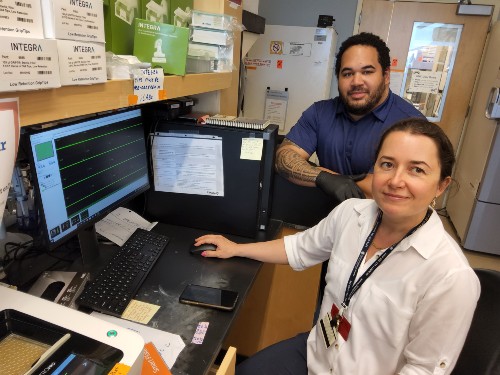
Staff
Mustafa Sahin, MD, PhD
Director
Elizabeth Buttermore, PhD
Associate Director
Lee Barrett, PhD
Assistant Director, Assay Development and Screening Facility
Cidi Chen, PhD
Assistant Director, CRISPR Services
Nina Makhortova, MD, PhD
Assistant Director, Phenotyping Services
Dosh Whye, MS
Assistant Director, Differentiation Services
Erika Norabuena
Research Lab Manager
Taryn Polanco
Research Assistant
Becca Lewis
Research Assistant
Ryan Guardado
Repository Research Coordinator
Remi Hirsh
Repository Research Coordinator
Repository questions and project inquiries
TNC@childrens.harvard.edu.
Please allow up to two weeks for responses.
Access iLab to schedule a service.
Service requests are reviewed monthly.
The Human Neuron Core is a state-of-the-art facility for disease modeling in human neurons derived from patients. We draw on the expertise of a community of researchers in developmental neuroscience, neurology and stem cell science to support preclinical assay development and to screen for potential therapeutics.
Equipment
- Revvity Opera Phenix Plus high content imaging device
- Molecular Devices IXM-C high content imaging device.
- Axion BioSystems MaestroPro multi-electrode array recording device.
- Hamamatsu FDSS 7000E dynamic cellular assay imager.
- Sartorius IncuCyteS3 live imaging device.
- Multiple liquid handlers.
- NOW AVAILABLE — CRISPR/Cas9 gene editing of iPSCs services.
Services
- Sample procurement of primary patient samples for reprogramming to iPSCs.
- Neuron differentiation services to generate neurons from core- or user-derived iPSC lines. Protocols exist to generate various subtypes of cortical neurons and motor neurons. Additional protocols are in progress.
- Phenotypic assay services for characterizing human neuron disease models with high content imaging, functional analysis, or transcriptomic analysis.
- Medium- to high-throughput screening and miniaturization of cell-based assays for therapeutic discovery, including assistance with assay development and automation.
Repository
The Human Neuron Core hosts a Repository for Neurological Disorders. The Repository is a data and biological specimen bank that pairs biological samples (including DNA, RNA, cerebral spinal fluid, brain tissue, and serum) with phenotypic data for translational research and clinical trials. Sample collections are available for fellowship projects through an application process.
Clinical Neurophysiology Research Core

Staff
Director
Hing Cheong (Henry) Lee, PhD
Science Program Manager
Catherine Serianni, MPH
Research Project Manager
Service requests are reviewed monthly.
The Clinical Neurophysiology Research Core (CNRC) aims to become a leader in the acquisition and analysis of high-quality human neurophysiological data to reflect neural circuit integrity in neurologic disease and developmental disorders. The CNRC occupies a purpose-built space at the Brain, Mind & Behavior Center at Two Brookline Place, and is outfitted with several new NIH-funded, high density electrophysiology systems that provides integration with stimulus presentation, eye tracking, transcranial magnetic stimulation (TMS), and magnetic resonance imaging (MRI). The Core also utilizes a customized platform for high-throughput electroencephalography (EEG) data analysis.
Clinical Services:
- High density EEG data collection with stimulus presentation, eye-tracking, TMS and MRI
- High throughput EEG data analysis, including spectral power, cross frequency coupling, and event-related measures
- Acquisition and analytical training for study teams
Consultation services:
- Trial design & paradigm development
- Rationale for neurophysiology measures to target disorders or developmental processes
- Assessment of data acquisition needs
- Literature review and assessment of outside competitive efforts
- Identification of potential research collaborators
- Recommended software or platform for processing
We also act as a conduit to the Epilepsy Monitoring Unit led by Dr. Alexander Rotenberg and interface with the Research Imaging Core led by Dr. Simon Warfield for imaging-based biomarker acquisition.
Clinical Research Operations Core
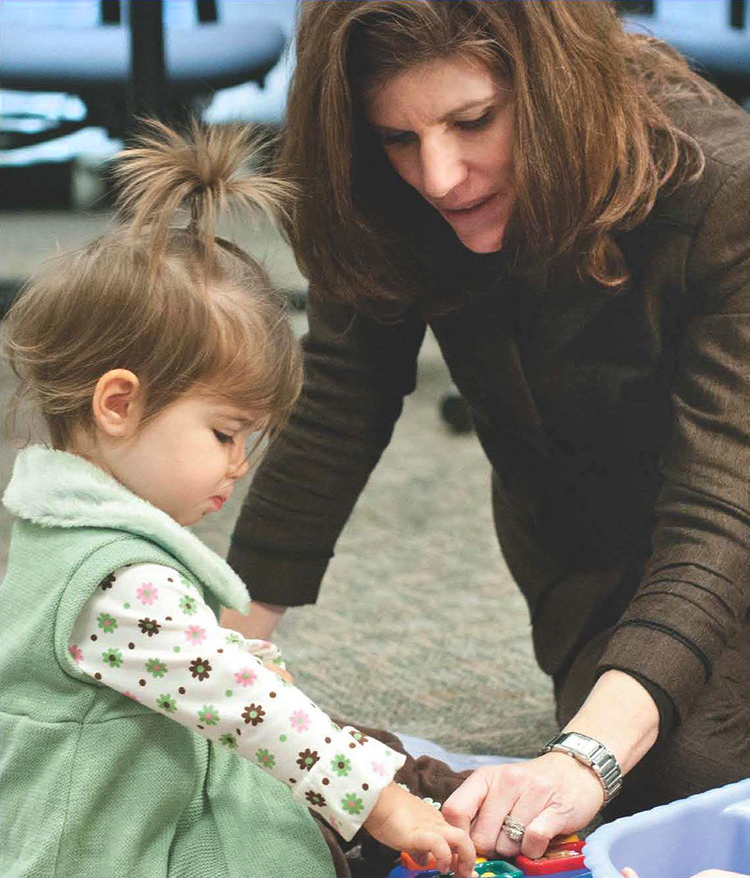
Staff
Stephanie Jo Brewster, MS, CGC
Director
Ellen Hanson, PhD
Managing Director, Human Neurobehavioral Core Service
Celia Tam, PhD
Senior Staff Scientist, Human Neurobehavioral Core Service
Charles A. Nelson, PhD
Director, Research Participant Registry
Service requests are reviewed monthly.
The Clinical Research Operations Core collaborates with investigators to plan and implement translational research through each stage of the drug discovery pipeline — from study design to regulatory submissions.
Clinical Research and Regulatory Affairs Service
Our team includes clinical research managers, genetic counselors, research nurses, regulatory specialists and study coordinators with expertise in protocol development, regulatory policy, study start-up and project execution. We offer regulatory guidance, study-staff training, project management support and study recruitment assistance for a variety of clinical research projects, including preclinical to phase 2 clinical trials, biomarker, and outcome studies.
Services provided:
- Guidance with respect to federal, state and institutional policies, including Good Clinical Practice.
- Consultation regarding protocol and consent form development.
- Facilitation of Institutional Review Board (IRB) and FDA submissions.
- Implementation of new studies.
- Project management.
- Development of training materials and workshops for study personnel.
Human Neurobehavioral Core Service
The Human Neurobehavioral Core Service (HNBCS) develops and provides behavioral assessment resources for translational neuroscience research at Boston Children’s Hospital. The Service was established through a collaboration between the Neurodevelopmental Disorders Phenotyping Program and Laboratories of Cognitive Neuroscience in the Division of Developmental Medicine and the Clinical Behavioral Science Core in the Department of Psychiatry and Behavioral Sciences.
We offer the consulting services of senior research psychologists with expertise in the development, administration and analysis of neurobehavioral assessments from birth through adulthood. A supervising clinical psychologist and research assistants are available to support clinical research including clinical trial execution. Our staff is trained to administer numerous measures including adaptive, behavioral, language and cognitive testing to families with a variety of neurodevelopmental disorders as well as individuals who are typically developing.
We provide:
- Staff with expertise in the administration of neurobehavioral assessments for a wide variety of studies including clinical trials, natural history projects, phenotypic characterization, outcome studies and behavioral therapeutic interventions.
- Consultation on all aspects of study design including research protocol and study aims development.
- Guidance on selection of assessment measures to best capture characteristics desired for analysis.
- Training of study teams on select neurobehavioral measures.
The Human Neurobehavioral Core Service is a collaboration between the Rosamund Stone Zander Translational Neuroscience Center and the Division of the Developmental Medicine.
Research Participation Registry
We manage a Research Participation Registry of more than 30,000 individuals (children and adults) with typical and atypical development who have expressed interest in research participation. The Registry serves as a vital recruitment resource for investigators enrolling individuals of all ages with neurodevelopmental challenges as well as those who are typically developing.
The Research Participant Registry is a collaboration between the Rosamund Stone Zander Translational Neuroscience Center and the Division of the Developmental Medicine at Boston Children’s Hospital.
Translational Genomic Medicine Core
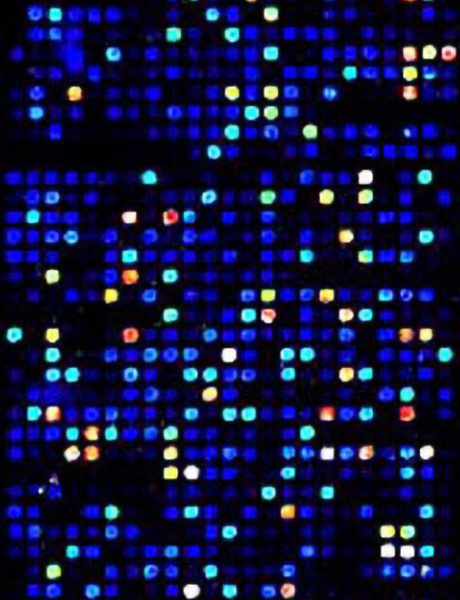
Staff
Maya Chopra, MBBS, FRACP
Director
Raymond Belanger Deloge, MS, CGC
Translational Genomic Medicine Specialist
Zoë Frazier, MS, CGC
Translational Genomic Medicine Specialist
Abigail Sveden, MS, CGC
Translational Genomic Medicine Specialist
Muhammed Cagri Bayraktutan, MD
Clinical Research Fellow
Service requests are reviewed monthly.
Led by a Clinical Geneticist / Pediatrician, the expertise of the Translational Genomic Medicine (TGM) Core is at the intersection of clinical genetics, clinical bioinformatics, and translational medicine. We offer consultation and collaboration for both clinical and research initiatives focused on rare Mendelian neurodevelopmental disorders (NDDs) within Boston Children’s Hospital as well as other institutions. The Core works closely with the other RSZ TNC cores to better delineate new genetic disorders, understand the underpinning mechanisms, and to evaluate the suitability of NDDs for gene-based therapeutic approaches.
We provide:
- Evaluation of gene targets for suitability for gene-based therapeutic development
- Consultation for incoming proposals for preclinical research, genotype-phenotype analyses, and natural history studies
- Gene curation expertise and leadership
- Establishment of natural history studies in collaboration with NDD patient advocacy groups
- Consultation for establishment of multi-disciplinary rare disease/convergent pathway clinics
- Training and mentorship at the intersection of variant interpretation and clinical genetics evaluation
- Clinical genetics expertise for clinical trials focused on monogenic disorders
Medicinal Chemistry Core
Small molecule drug discovery is a process that integrates medicinal chemistry with other disciplines including cell biology and animal pharmacology. Successful drug optimization transforms a screening hit or tool compound to a drug candidate. This process requires parallel optimization of desired drug activity in preclinical disease, pharmacokinetic, and toxicological models.
The medicinal chemistry core provides consultation and services throughout the process, from small molecule library selection and sourcing to lead optimization and drug candidate selection. To maximize efficiency, experimental design, troubleshooting, and project management are performed within the Core, and chemical synthesis is typically conducted at a network of preferred contract research organizations. Depending on project complexity, these services can be conducted on a fee-for-service, percent effort plus costs, or collaborative basis.
Our services include:
- Custom synthesis of drugs and tool compounds selected by investigators
- Selection and sourcing of chemical screening libraries
- Evaluation of screening hits
- Search of literature and patents by chemical structure
- Design of pharmacokinetic and toxicology experiments
- In silico screening using target structures or/or machine learning
- Target identification based on phenotypic screens
- Design and synthesis of novel screening hit analogs (hit-to-lead chemistry)
- Design and execution of preclinical pharmacokinetics experiments
- Design and management of lead optimization projects
- Evaluation and selection of drug candidates
In the future, we aim to provide preclinical bioanalytical services and targeted protein quantification.
Data Organization Collaboration Service
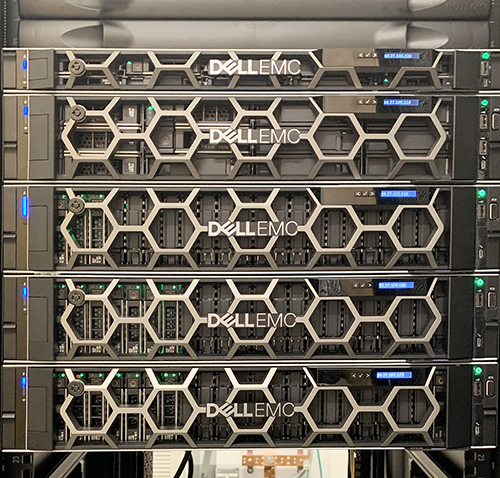
Staff
Alexander Li Cohen, MD, PhD
Director
Zexia Lu, BA, MS
Data Manager
Jiaqi Zhao, BS
Data Manager
Service inquiries
TNCDoCS@childrens.harvard.edu
Please allow up to two weeks for responses.
Service requests are reviewed monthly.
The Data Organization Collaboration Service (DoCS) offers mentorship and a venue for collaboration on all aspects of the research data lifecycle. This new service of the Rosamund Stone Zander Translational Neuroscience Center aims to:
1) connect research teams with institutional resources to implement Data Management Plans consistent with FAIR (findable, accessible, interoperable, and reusable) principles,
2) provide hands-on expertise in data science organization, and
3) facilitate peer-to-peer mentorship for clinical/translational research laboratories, particularly those utilizing EEG, ERP, MRI, and behavioral data. The central tenet of DoCS is that collaborative learning is a faster path to individualized expertise.
Our services include:
- Frequent workshops to review recently solved data issues,
- Shared on-line or side-by-side problem-solving support via Computer Science / Data Science trained Research Assistants
- Monthly seminars on BCH/HMS-specific resources and data solutions
- Shared infrastructure for data re-use, such as a Registry of Acquired Data from multiple studies and RedCap Templates and Validation to help studies get started more quickly.
- Mentorship for planning and implementing data structures for large-scale projects and/or multi-site studies
Cite Our Cores
“This research was conducted with support from the Rosamund Stone Zander Translational Neuroscience Center, Boston Children’s Hospital.”
If applicable, please also note support from IDDRC (NIH P50 HD105351).
Rosamund Stone Zander Translational Neuroscience Center Acknowledgement and Authorship Policy
- If you have used a RSZ TNC service; conducted work resulting from any RSZ TNC data or biomaterials; conducted work with the support of a RSZ TNC sponsored pilot project or fellowship; or received training through the RSZ TNC, please use the following citation language in any publications, presentations or media reports:
“This research was conducted with support from the Rosamund Stone Zander Translational Neuroscience Center, Boston Children’s Hospital.” If applicable, please also note support from IDDRC (NIH P30HD018655). - For the Human Neuron Core/Repository biomaterials (DNA, tissue specimens, ipscs, neurons, etc) please provide manuscript for review prior to submission for publication. This should include any supplementary data tables that clearly identify the samples that were selected for analysis and the type of assays performed (i.e. genetic variants, sequencing data, proteomic data, pathologic analysis, etc.).
- As soon as the Investigator has any manuscript accepted for publication based upon a research project utilizing a TNC service as detailed in #1, a copy of the manuscript along with the name of the publication and expected date of publication shall be forwarded to tnc@childrens.harvard.edu.
- Annually, investigators utilizing TNC services shall submit a list of all publications, presentations, and media reports to tnc@childrens.harvard.edu.
- Authorship related to TNC projects will be determined following the Harvard Medical School guidelines for inclusion and order of authorship and following the ICMJE guidance.
Defining the Role of Authors and Contributors; International Committee of Medical Journal Editors (ICMJE) LEARN MORE >



